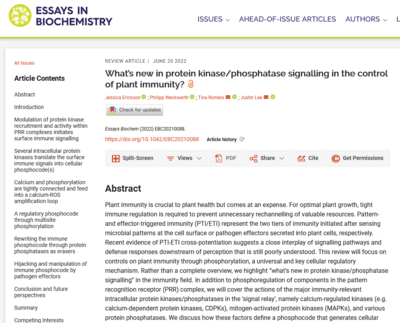Phospho-immuno cascades: Latest findings on plant immunity compiled.
Scientists of the Department Biochemistry of Plant Interactions have recently published a review article on the complex dynamics of signaling pathways in the plant immune response. In line with their expertise, they focused on the universal cellular regulatory mechanisms of phosphorylation, which also play a key role in the control of plant immunity. The article summarizes recent findings on immunity-relevant intracellular protein kinases/phosphatases and their interactions in the signaling network. The authors discuss how calcium-dependent protein kinases (CDPKs), together with mitogen-activated protein kinases (MAPKs) and various protein phosphatases, form a kind of phosphocode, on which the cell decides on the direction, intensity, duration and regulation of individual signaling pathways depending on the specific threat. To underscore the importance of phosphorylation, the Halle scientists also address the strategies of pathogens to bypass plant immune signaling pathways, e.g., via the formation of pathogen effector-based resistosomes that form calcium-permeable pores.



